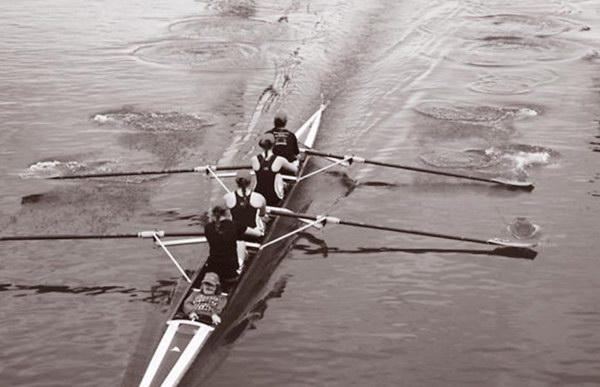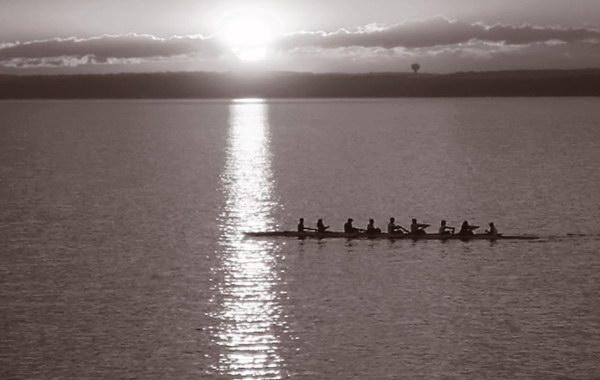The Boys in the Boat 激流男孩
2016-05-14ByDanielJamesBrown蒋素华/选注
By Daniel James Brown 蒋素华/选注


Just as a skilled rider is said to become part of his horse, the skilled oarsmen(桨手,划手)must become part of his boat. Harmony, balance, and rhythm. Theyre the three things that stay with you your whole life. Without them civilization is out of whack(运作失常). And thats why an oarsman, when he goes out in life, he can fight it, he can handle life. Thats what he gets from rowing.
—George Yeoman Pocock(造船工匠兼大师波科克)
Ulbrickson took a position slightly up the ramp(斜坡)from them, to gain a bit of height advantage over these very tall boys. Things like that mattered to Ulbrickson. To marshal(引领)large men who were not all that much younger than him, and in many cases just as strong willed, he needed every advantage he could get. He straightened his tie and took his Phi Beta Kappa1 key from his vest(汗衫)pocket and began to twirl it on its lanyard(勋带), as he often did on such occasions. He gazed out over them for a moment, saying nothing, letting his attitude silence them. And then, without prelude(前奏,开场白), he began to tell them how it was going to be.
“You will eat no fried meats,” he began abruptly. “You will eat no pastries(油酥点心), but you will eat plenty of vegetables. You will eat good, substantial(丰盛的), wholesome(有益健康的)food—the kind of food your mother makes. You will go to bed at ten oclock and arise punctually(准时地)at seven oclock. You will not smoke or drink or chew. And you will follow this regimen(养生法,生活规则)all year round, for as long as you row for me. A man cannot abuse(滥用)his body for six months and then expect to row the other six months. He must be a total abstainer(节制者)all year. You will not use profane(亵渎的)language in the shell(轻赛艇)house, nor anywhere within my hearing. You will keep at your studies and maintain a high grade point average. You will not disappoint your parents, nor your crewmates. Now lets row.”
There is a thing that sometimes happens in rowing that is hard to achieve and hard to define. Many crews, even winning crews, never really find it. Others find it but cant sustain(维持)it. Its called “swing(协调一致).” It only happens when all eight oarsmen are rowing in such perfect unison(一致,和谐)that no single action by any one is out of synch(不同步)with those of all the others. Its not just that the oars enter and leave the water at precisely the same instant. Sixteen arms must begin to pull, sixteen knees must begin to fold and unfold, eight bodies must begin to slide forward and backward, eight backs must bend and straighten all at once. Each minute action—each subtle turning of wrists—must be mirrored exactly by each oarsman, from one end of the boat to the other. Only then will the boat continue to run, unchecked(未遭抑制的), fluidly(流畅地)and gracefully between pulls of the oars. Only then will it feel as if the boat is a part of each of them, moving as if on its own. Only then does pain entirely give way to exultation(狂喜). Rowing then becomes a kind of perfect language. Poetry, thats what a good swing feels like.
A good swing does not necessarily make crews go faster, except to the extent that if no ones actions check(制止)the run of the boat, rowers get more bang for their buck(得到更多的回报)on each stroke(划水). Mainly what it does is allow them to conserve(保存)power, to row at a lower stroke rate and still move through the water as efficiently at a higher rate. It allows them to possess a reserve(储备)of energy for a gut-wrenching(撕心裂肺的), muscle-screaming(肌肉疼到极限的)sprint(冲刺)at the end of a race. It is insanely difficult to keep a good swing as your raise your rate. As the tempo(速度)increases, each of the myriad(无数的)separate actions has to happen at shorter and shorter intervals, so that at some point it becomes virtually impossible to maintain a good swing at a high rate. But the closer a crew can come to that ideal—maintaining a good swing while rowing at a high rate—the closer they are to rowing on another plane(水平), the plane on which champions row.
Joe and his crew-mates had found their swing as freshmen the day theyd won in Pouhkeepsie(波基普西市,位于纽约州), and Al Ulbrickson had not forgotten that. He could not, in fact, get the picture of it out of his mind. There had been something marvelous, almost magical, about how they closed out that race. He had to believe that it was still there.
Rowing is, in a number of ways, a sport of fundamental paradoxes(悖论). For one thing, an eight-oared racing shell—powered by unusually large and physically powerful men or women—is commanded, controlled, and directed by the smallest and least powerful person in the boat. The coxswain(舵手,艇长)(nowadays often a female even in an otherwise male crew) must have the force of character to look men or women twice his or her size in the face, bark(尖叫)orders at them, and be confident that the leviathans2 will respond instantly and unquestioningly to those orders. It is perhaps the most incongruous(不协调的,不一致的)relationship in sports.
Another paradox lies in the physics of the sport. The object of the endeavor is, of course, to make the boat move through the water as quickly as possible. But the faster the boat goes, the harder it is to row well. The enormously complicated sequence of movements, each of which an oarsman must execute with exquisite(强烈的)precision, becomes exponentially(成倍地)more difficult to perform as the stroke rate increases. Rowing at a beat of thirty-six is vastly more challenging than rowing at a beat of twenty-six. As the tempo accelerates, the penalty(惩罚)of a miscue(错误,差错)—an oar touching the water a fraction of a second too early or too late, for instance—becomes ever more severe, the opportunity for disaster ever greater. At the same time, the exertion(努力)required to maintain a high rate makes the physical pain all the more devastating(毁灭性的)and therefore the likelihood of a miscue greater. In this sense, speed is both the rowers ultimate goal and also his greatest foe(敌人,危害物). Put another way, beautiful and effective rowing often means painful rowing. An unnamed coach is reputed(被认为)to have said, bluntly(坦率地), “Rowing is like a beautiful duck. On the surface it is all grace, but underneath the bastards paddling(划水)like mad!”
But the greatest paradox of the sport has to do with the psychological makeup of the people who pull the oars. Great oarsmen and oarswomen are necessarily made of conflicting stuff—of oil and water, fire and earth. On the one hand, they must possess enormous self-confidence, strong egos, and titanic willpower(巨大的毅力). They must be almost immune to(不受影响的)frustration. Nobody who does not believe deeply in himself or herself—in his or her ability to endure hardship and to prevail over adversity(逆境)—is like even to attempt something as audacious(无畏的)as competitive rowing at the highest levels. The sport offers so many opportunities for suffering and so few opportunities for glory that only the most tenaciously(顽强地)self-reliant(自力更生的)and self-motivated are likely to succeed at it. And yet, at the same time—and this is key—no other sport demands and rewards the complete abandonment of the self the way that rowing does. Great crews may have men or women of exceptional talent or strength; they may have outstanding coxswains or stroke oars(尾桨划手)or bowmen(头桨划手); but they have no stars. The team effort—the perfectly synchronized(同步的)flow of muscle, oars, boat, and water; the single, whole, unified, and beautiful symphony(交响曲)that a crew in motion becomes—is all that matters. Not the individual, not the self.
The psychology is complex. Even as rowers must subsume(把……纳入)their often fierce sense of independence and self-reliance, at the same time they must hold true to their individuality, their unique capacities as oarsmen or oarswomen or, for that matter, as human beings.
And capitalizing on(利用)diversity is perhaps even more important when it comes to the characters of the oarsmen. A crew composed entirely of eight amped-up(放大的), overtly aggressive oarsmen will often degenerate(退化,堕落)into a dysfunctional brawl(功能失调的争吵)in a boat or exhaust itself in the first leg(局)of a long race. Similarly, a boatload of quiet but strong introverts(内向的人)may never find the common core of fiery resolve(炽烈的决心)that causes the boat to explode past its competitors when all seems lost. Good crews are good blends(混合,交融)of personalities; someone to lead the charge, someone to hold something in reserve; someone to pick a fight, someone to make peace; someone to think things through, someone to charge ahead without thinking. Somehow all this must mesh(相啮合). Thats the steepest(要求最令人难以接受的)challenge. Even after the right mixture is found, each man or woman in the boat must recognize his or her place in the fabric(结构)of the crew, accept it, and accept the others as they are. It is an exquisite(精致的)thing when it all comes together in just the right way. The intense bonding and the sense of exhilaration(愉快)that results from it are what many oarsmen row for, far more than for trophies or accolades(荣誉,奖励). But it takes young men or women of extraordinary character as well as extraordinary physical ability to pull it off(成功获得).
Thats what Al Ulbrickson believed he had seen in Washingtons sophomore boat in Poughkeepsie the previous June. They had become that perfect thing that all crew coaches seek. He remained almost desperately reluctant now to tear the fabric of what held them together then, but the boys seemed to be leaving him no choice. They seemed to have come unraveled(解决)all on their own.
